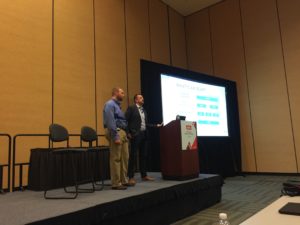I'm sure you have heard and read a lot about microservices in the recent past and how they are here to defend our end users from the horrible monolith. Breaking an application up into many components is a great start, but to take your organization to the next level requires a platform focused on integrating microservices into your continuous improvement process. Red Hat's James Rawlings & James Strachan led us through achieving our new goal of continuous delivery with containerized microservices. The way to go fast while developing is ensuring that all microservices have their own release cycle. Splitting your team up to align with your microservices will allow faster changes, the ultimate goal. In order to take advantage of many rapid releases your deployment and testing processes must be automated. Automating your build process and creating continuous feedback loops is the way to go.
Fabric8 enables you to create microservices, build immutable containers, perform rolling upgrades across runtime environments. Your services gain capabilities for service discovery and scaling, management and feedback. As a platform, it will automate many of the tasks your team is performing today like connecting Jenkins to your Git repository and deploying the new build to a testing environment.
The other presenter, also named James, then took the stage and walked us through a great demo showing Fabric8 running on the Google Compute Engine. Using the kubectl tool James connected the GCE cluster directly to his Kubernetes cluster. Using a few simple command he created and deployed the Fabric8 components, and was editing, building, and deploying a Java application (using Camel!) in no time. Monitoring came out of the box with Kibana for visualizing log events across pods. Fabric8 will even help coordinate a rolling upgrade of a new version of the application.
Then we got a detailed overview of the three big underlying components powering Fabric8; Docker, Kubernetes, and Jenkins. There are several features Fabric8 adds on top of these three giants like re-usable pipelines to make the platform work for you. Fabric8 makes use of many other services such as: ElasticSearch for storing logs, Kibana for viewing those logs, Prometheus for service monitoring and metrics with a Grafana frontend. Having the logs is great, but Fabric8 builds on top of that by using Zipkin for fine-grained tracing between microservices.
I'm looking forward to hearing more from the Fabric8 team about continuing to provide a platform for microservices.
Last updated: March 16, 2018
